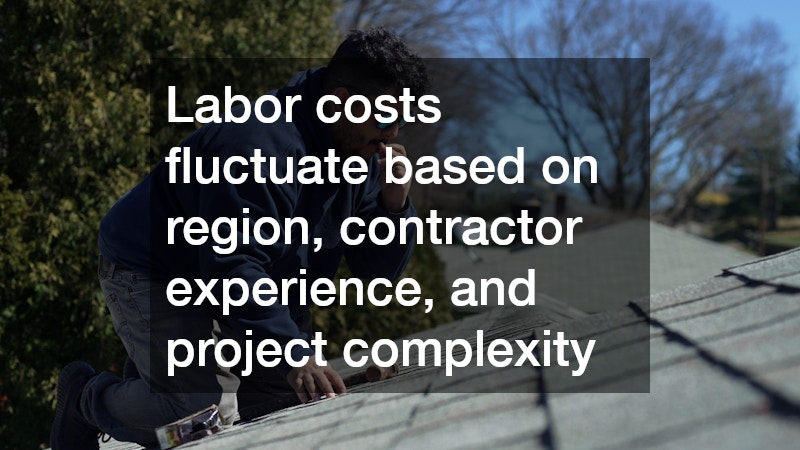
Highlights:
-
Roofing costs are heavily influenced by the type of roofing material chosen.
-
Roof size and complexity directly affect labor and material expenses.
-
Labor rates, contractor experience, and insurance impact total project costs.
-
Roof repairs and preparation work must be factored into overall expenses.
-
Regional climate and seasonal timing influence material choice and installation costs.
-
Always request multiple estimates from a roofing company that offers free quotes.
-
Ensure warranties and detailed cost breakdowns are included to protect your investment.

When it comes to maintaining or replacing a roof, understanding the costs involved is crucial. Homeowners often wonder why roofing prices vary so widely, even for seemingly similar homes. A roofer who offers estimates can help, but knowing the key factors ahead of time can prepare you for what to expect. In this article, we’ll explore the top five factors that influence roofing costs, helping you make informed decisions for your home.
1. Type of Roofing Material
One of the most significant factors affecting your roofing costs is the type of material you choose. Each roofing material has its advantages, lifespan, and installation complexity, which directly impacts pricing.
Common Roofing Materials and Costs:
-
Asphalt Shingles:
Asphalt shingles are the most popular roofing material in the United States due to their affordability and durability. Prices can range from $90 to $150 per square (100 square feet) for standard shingles. Premium architectural shingles can cost $150 to $300 per square. A roofing company that offers free quotes can help you understand costs for different types of asphalt shingles. -
Metal Roofing:
Metal roofs are durable and energy-efficient, often with lifespans exceeding 50 years. However, they are more expensive, with costs ranging from $300 to $700 per square. The complexity of installation may also increase labor costs, which a roofing company that offers estimates will consider in your project. -
Wood Shingles or Shakes:
Wood shingles provide a natural aesthetic but require more maintenance and may be prone to fire hazards if not treated. Expect costs between $400 and $700 per square. -
Slate and Tile Roofing:
Slate and clay tiles are premium options offering exceptional longevity and a distinctive appearance. However, installation is labor-intensive, and material costs can range from $600 to $1,500 per square. A roofing company offering free estimates will account for these materials’ weight and handling requirements.
Key Considerations:
Choosing a roofing material is not just about aesthetics; it’s also about long-term investment. A roofing company that offers free quotes will evaluate your home’s structure and recommend materials that fit your budget and needs.
2. Roof Size and Complexity
The size and complexity of your roof significantly impact the overall cost. A larger roof naturally requires more materials and labor, while complex designs with multiple slopes, angles, and architectural features can increase labor intensity.
Factors Related to Size and Complexity:
-
Roof Area:
Roofs are measured in “squares,” with one square equal to 100 square feet. The more squares your roof has, the more materials and labor are required. A trusted roofing company can provide a precise measurement and calculate material costs accurately. -
Pitch and Slope:
Roofs with steep pitches or multiple slopes require additional safety precautions and specialized equipment. These factors can increase labor costs by 10-20%. -
Architectural Features:
Chimneys, skylights, dormers, and vents add complexity to installation. Each feature requires additional flashing and sealing to prevent leaks, which a roofing company that offers estimates will factor into your quote. -
Access and Work Conditions:
Homes with difficult access or tight spaces may require extra labor or equipment, such as scaffolding or lifts. This is another element considered by a roofing company that offers free quotes.
Practical Advice:
Even small changes in roof design or slope can significantly influence cost. When consulting a roofing company that offers free quotes, ask them to explain how complexity affects pricing.
3. Labor Costs and Contractor Rates

Labor is often one of the most substantial components of roofing costs. While materials can be priced upfront, labor costs fluctuate based on region, contractor experience, and project complexity.
Key Labor Considerations:
-
Local Labor Rates:
Labor costs vary across the country. Urban areas may have higher rates due to increased demand, while rural areas may offer more competitive pricing. A roofing company that offers estimates can provide a localized quote based on prevailing labor rates. -
Experience and Expertise:
Hiring an experienced roofing contractor often costs more but ensures quality workmanship and adherence to safety standards. Companies with certified roofing professionals tend to charge a premium. -
Project Size and Duration:
Large projects require more workers and time. Extended timelines may result in higher labor costs due to crew scheduling and overhead. -
Insurance and Licensing:
A reputable roofing company that offers free quotes will factor in insurance coverage and licensing, ensuring liability protection for both the contractor and homeowner.
Tips for Homeowners:
Don’t automatically choose the cheapest labor option. A reliable roofing company that offers free estimates will balance cost with quality and warranty coverage to protect your investment.
4. Roof Repairs and Preparation Work
Before installing a new roof, many homes require preparation work or repairs. Ignoring these steps can lead to long-term issues and higher costs down the road.
Common Preparation Tasks:
-
Old Roof Removal:
Tearing off an old roof can cost $100 to $150 per square, depending on material and disposal requirements. A roofing company that offers estimates will include this in your quote. -
Structural Repairs:
Rotten wood, sagging decks, or damage from leaks must be addressed before installation. Structural repairs can significantly increase total costs but are critical for roof integrity. -
Underlayment and Flashing:
Installing proper underlayment and flashing is essential for waterproofing. Premium underlayment materials may cost more but provide added protection. -
Inspection Fees:
Some roofing companies charge for initial inspections or detailed roof assessments, which can be incorporated into the final estimate.
Insight:
Preparation work is often overlooked, but it’s a critical factor in roofing costs. A roofing company that offers free quotes can evaluate your roof’s current condition and provide a detailed plan and pricing.
5. Regional Climate and Seasonal Timing
Weather and climate can influence both material choice and labor requirements. Homes in extreme weather zones may require additional reinforcements or specialized materials.
Climate-Related Cost Factors:
-
Temperature and Precipitation:
Cold, snowy regions may require ice and water shields, while hot, sunny areas may benefit from reflective materials. Each addition can affect material and labor costs. -
Wind and Hail Resistance:
Certain regions require roofing materials rated for high winds or hail resistance. These specialty materials can increase overall costs. -
Seasonal Availability:
Roofing during peak seasons (spring and summer) may cost more due to high demand. Conversely, winter installations can pose challenges for crews and may require heating elements to install shingles correctly. -
Insurance Requirements:
Homes in hurricane or storm-prone areas may have stricter insurance requirements for roofing materials, which can increase cost. A roofing company that offers estimates will consider these regulations in your quote.
Practical Recommendation:
Discuss climate considerations with a roofing company that offers free estimates to ensure your roof is both durable and compliant with local building codes.
Additional Tips for Homeowners Seeking Roofing Estimates
-
Request Multiple Quotes:
Don’t settle for the first estimate. Comparing several roofing companies that offer free quotes helps identify fair pricing and services. -
Verify Credentials:
Ensure the company is licensed, insured, and has a strong reputation. Ask for references or read online reviews. -
Understand the Estimate Breakdown:
Look for a detailed estimate that separates materials, labor, permits, and other fees. A transparent roofing company that offers free quotes will provide this information. -
Ask About Warranties:
Material and labor warranties can protect your investment. Confirm the terms and duration before signing a contract. -
Plan for Contingencies:
Unexpected repairs or material shortages can arise. Budgeting an additional 10-15% can prevent surprises during installation.
In Closing
Roofing costs are influenced by multiple factors, from material choice and roof complexity to labor, preparation, and climate. Understanding these elements empowers homeowners to make informed decisions and ensures that your roofing investment delivers long-lasting results. Consulting a reliable roofing company that offers free quotes is crucial, as they can provide accurate pricing, identify potential challenges, and recommend the best materials and solutions for your home. By considering the factors outlined above, you can plan effectively, avoid unexpected expenses, and achieve a safe, durable, and aesthetically pleasing roof.